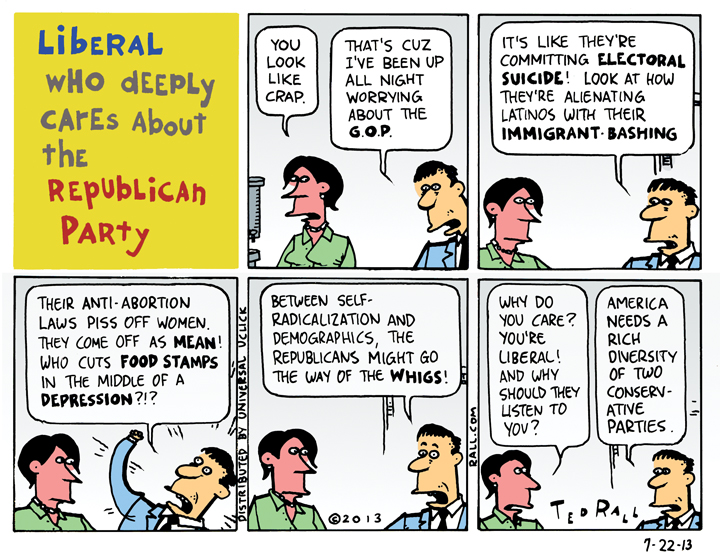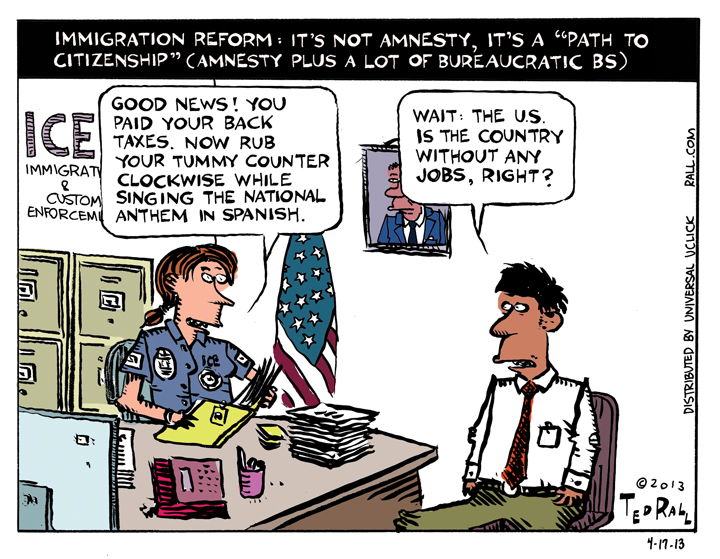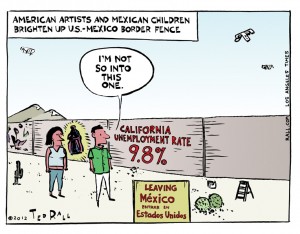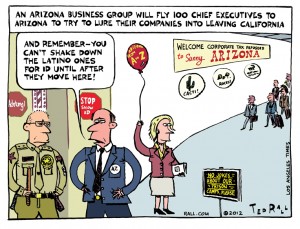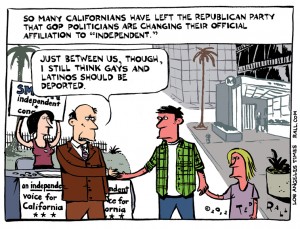Why do some liberals spend so much time advising the GOP how to do better in elections? Why do they expect Republicans to listen?
LOS ANGELES TIMES CARTOON: Not So Into This
I draw cartoons for The Los Angeles Times about issues related to California and the Southland (metro Los Angeles).
This week: For nearly a year, a contingent of artists from southeastern Arizona has joined forces with Mexican children to paint portions of the 650 miles of border fence separating the United States and Mexico.
LOS ANGELES TIMES CARTOON: Arizona Gives the Business
I draw cartoons for The Los Angeles Times about issues related to California and the Southland (metro Los Angeles).
This week: An Arizona business group will fly 100 chief executives to Arizona to try to lure their companies into leaving California.
SYNDICATED COLUMN: The Leftist Republican Party of the Future
To Survive, GOP Should Out-Democrat the Democrats
Republicans, engaging in the traditional losing party’s post-election wound-licking, blame-flinging and anger-at-the-dumb-voters ritual, are facing the awful truth: The American people just aren’t into their gay-bashing, race-baiting, woman-hating, Eisenhower-era positions on social issues.
“It’s not that our message–we think abortion is wrong, we think same-sex marriage is wrong–didn’t get out. It did get out,” R. Albert Mohler Jr., president of the Southern Baptist Theological Seminary in Louisville told The New York Times. “It’s that the entire moral landscape has changed. An increasingly secularized America understands our positions, and has rejected them.”
Exasperated radio blowhard Rush Limbaugh asks:
“Condoleeza Rice…is a pinnacle of achievement, and intelligent, and well-spoken…You can’t find a more accomplished person. Marco Rubio. And really, speaking in street lingo, we’re not getting credit for it…Are these people perceived as tokens?”
Yes. Uncle Toms are easy to spot.
“In order to get the Hispanic or Latino vote, does that mean open the borders and embrace the illegals?”
Yes.
“If we’re not getting the female vote, do we become pro-choice?”
Yes.
Liberal pundits are helpfully offering advice to their Republican counterparts this week, arguing that if that if GOP officials and pundits make a few nips and tucks into their Neanderthal platform and tone, downplaying their unpopular stances on social issues, they may yet save their white male–dominated party from irrelevance.
Let’s set aside the obvious fact that no one does nor should listen to counsel offered by their enemies. And that even a devastating defeat–not that this one was–doesn’t always necessarily take long to recover from. Consider, for example, the post-2008 commentaries wondering whether there was a future for the GOP; by early 2010 the written-off-as-dead Republicans were riding high.
Nevertheless, Republicans might be more willing to listen to me than to other left-of-center columnists. After all, I love the GOP just as much as I care for the Democrats (not at all). Really, truly, I don’t give a rat’s ass which corporate party wins or loses.
The Republicans’ big problem is that they think they’re me.
I am a pundit. I am an idealist. The pay isn’t great, but I get to be pure, to stand up for what I think is right regardless of whether or not anybody else is willing to follow me. My job isn’t to be popular. It’s to be right.
If I were tapped to head a major political party like the Republicans, however, I wouldn’t have the luxury of being right at the price of being unpopular. Political parties are in the business of trying to win elections. To paraphrase the philosopher Don Rumsfeld, you run campaigns with the voters you have, not the ones you wish you had.
It’s one thing to push for changes that your ideological base believes in. God knows the Democrats should do that sometimes. It’s another to commit political hari-kari, trying to fight the tide by espousing points of view that are not only in the minority, but whose constituencies are consistently shrinking.
If Republicans want to win elections here in the United States, they need to set the stage for a transformational shift as dramatic as 1932, when FDR turned the Democrats into the party of liberalism and progressivism.
Republicans need not wonder why Obama got 71% of the Latino vote; if anything, the shocker is that that figure wasn’t higher. For decades, right-wing talk radio hosts and other Republican surrogates have been bashing illegal immigration (racist code for anti-Hispanic propaganda, particularly on the West Coast). Now that the Latino vote has become essential to win national races, the GOP can no longer afford its hardline stance on immigration, whether the reasons behind it are evilly nativist, benignly protectionist or law-and-order upright.
On every social issue of note, Americans are moving away from the Republican Party. We are becoming more tolerant of gays and their rights, more supportive of abortion rights, and more open to people of different backgrounds. Despite the terrible economy, Americans are less inclined to blame their troubles on competition from undocumented workers.
These trends toward a leftier country are long term and unlikely to reverse in the near future.
Beginning last summer, Republican strategists consciously decided to downplay Mitt Romney’s stances Republican Party platform’s takes on social issues. Now liberal commentators are joining them, strangely and cynically suggesting that Republicans need to change their emphasis of their messaging–but not the content of their policies.
Style isn’t enough. Republicans are doomed unless they radically change to social-issues policies that are not only in step with the country, but to its left–since the electorate will soon catch up. If the Party of Lincoln is adaptable and intelligent–which I seriously doubt–they will exploit the opportunity to move, not just left, but to the left of the center-right Democratic Party, which abdicated its traditional progressive stands on social issues when, for example, Bill Clinton signed the Defense of Marriage Act and gutted welfare.
The GOP could make good on its long-standing assertion that it favors a legal path to immigration by proposing that we open our doors to a huge surge of legal immigration. That would be consistent with previous opinions, and outmaneuver the Democrats, who have been reluctant to favor much immigration at all, and who have deported record numbers of Hispanics over the last four years.
Yes, Mr. Limbaugh, the Republican Party must become unabashedly pro-choice if it wants to keep the women’s vote. The Republican Party claims to be the party of small government conservatism; why not say that this is a simple matter of keeping the government out of our bedrooms and out of women’s bodies? Same thing goes for gay marriage and other rights for people who are discriminated against due to their sexual orientation.
You can’t roll out a new and improved Republican Party social-issues platform overnight without alienating the crazy Christian fundamentalists and other unattractive sorts who currently form the basis of the Republican Party at present. But you can start a transition to a viable future in a methodical, gradual way that prepares the Republican Party for the huge demographic shifts that will drive the politics of the country as it moves further and further to the left.
(Ted Rall‘s is the author of “The Book of Obama: How We Went From Hope and Change to the Age of Revolt.” His website is tedrall.com.)
COPYRIGHT 2012 TED RALL
LOS ANGELES TIMES CARTOON: Lower the Ladder a Little
I draw cartoons for The Los Angeles Times about issues related to California and the Southland (metro Los Angeles).
This week: In the nearly two decades since Californians voted to bar undocumented immigrants from utilizing public schools and hospitals, the state’s electorate has become increasingly tolerant toward people who are in the country illegally, although it remains tough on border security and enforcement, a new USC Dornsife/Los Angeles Times poll shows. The shift is partly explained by the growing clout of Latinos, who now make up 20% of California voters. But the attitudes of whites also appear to have changed.
LOS ANGELES TIMES CARTOON: Distrust of the Trust Act
I draw cartoons for The Los Angeles Times about issues related to California and the Southland (metro Los Angeles).
This week: If the California Trust Act becomes law, Los Angeles Sheriff Lee Baca says he won’t enforce it. The law would block from turning over suspects in minor crimes to the federal government for deportation.
SYNDICATED COLUMN: Why We’re Apathetic
Obama and Romney Ignore the #1 Issue
Don’t be apathetic, they tell us. If you don’t vote, you can’t complain. But how can people get excited about a political campaign that doesn’t address the issues we care about most?
Polls show that Americans are more concerned about the economy than any other issue. That has been the case since Obama became president in 2009.
Ignoring the elephant in the room, neither Obama nor Romney have put forth credible plans for getting the unemployed back to work or getting raises for those who still have jobs—and forget about underemployment. (In the long run, America’s biggest jobs problem isn’t that workers don’t have enough skills, but that millions are working beneath their level of intelligence and educational attainment.)
Obama says he inherited a mess. He’s right. His supporters say climbing out of the hole created by the 2008 meltdown and Bush’s deficit spending will take time. Which is true. But Obama never proposed a jobs program—so he can’t claim that Republican Congressional meanies blocked him.
Bizarrely, the President doesn’t explicitly promise that the economy will get better if we reelect him. His reelection campaign is mostly backwards looking, pointing to his achievements so far: healthcare, pulling out of Iraq, the assassination of Osama bin Laden, and his unpopular bailout of the big banks. On the economy, his overall approach has been to counsel patience, while hoping for things to improve.
Say this for Mitt Romney: he doesn’t share the president’s reticence. “If I become president, you’re going to see an economic resurgence: manufacturing resurgence, high-tech, health care. You’re going to see this economy take off,” Romney told supporters in New Jersey last month. “And I say that because I know what I’m going to do, and I know what kind of impact it will have.”
Romney’s ads strike the same can-do tone. “By day 100, President Romney’s leadership brings new certainty to our economy, and the promise of new banking and high-tech jobs.”
Whoa.
How will this kickass FDR-like miracle transpire? Romney has put forth what John Cassidy of The New Yorker calls a “ragtag collection of proposals—59 of them, ranging from eliminating the inheritance tax, to capping federal spending at twenty per cent of GDP, to opening up America’s energy reserves for development [which have been] widely dismissed as inadequate by his fellow Republicans.”
Trickle-down redux. Warmed-over drill-baby-drill
Sarahcuda. A dash of Steve Forbes (remember him?). In short: not so whoa.
If I were Romney I’d be proposing a conservative-based jobs-growth agenda—i.e., one that puts money into the pockets of business. Tax incentives for employers to hire new workers. Federal subsidies for job training programs. Higher payroll deductions for corporations. Capital gains tax cuts conditioned on funds being invested into projects that generate new jobs.
Romney could shore up his party’s nativist base by promising to build an impenetrable fence along the border with Mexico and to crack down on undocumented workers.
Thanks to the Republican Congress, it would be easy for Obama to make the case to voters that he’s trying to create jobs. He could propose something bold and grand, a new WPA that directly employs 20 million Americans building high-speed rail lines, new bridges and tunnels, teachers, artists, you name it. Best of all, it’s a promise he wouldn’t have to keep. The GOP would block it—turning them into the obstructionists Democrats portray them as.
Obama could also pursue small-bore approaches to the jobs problem, such a “first fired, first rehired” law that requires large employers to offer new jobs to their first layoff victims. The United States should join European countries, which don’t set arbitrary time limits on unemployment benefits. Layoff victims shouldn’t lose their homes; a federal program should cover their rent or mortgage payments until they get back on their feet.
Would these ideas fix the economy? Maybe not. But they would certainly go a long way toward reversing the current toxic state of electoral politics, in which the major parties float irrelevant wedge issues in their perennial battle over two or three percent of the vote in a handful of swing states, by engaging citizens in the process.
Will either party push forward a credible solution to the economic crisis? Probably not. Which is a reflection of the system’s inability to reform itself, and a harbinger of revolutionary change to come.
(Ted Rall’s new book is “The Book of Obama: How We Went From Hope and Change to the Age of Revolt.” His website is tedrall.com. This column originally appeared at NBCNews.com)
(C) 2012 TED RALL, ALL RIGHTS RESERVED.
Los Angeles Times Cartoon: Free-Range Republicans
I draw cartoons for The Los Angeles Times about issues related to California and the Southland (metro Los Angeles).
This week: So many Californians have left the Republican Party that GOP politicians are changing their official affiliation to “independent.”

